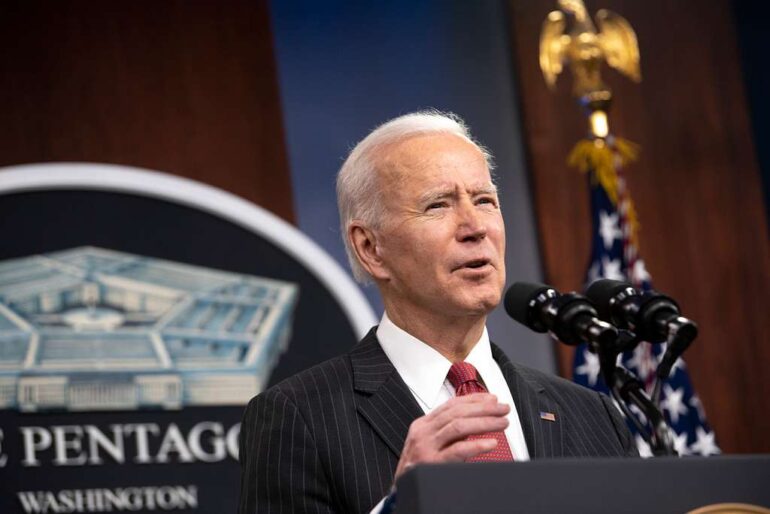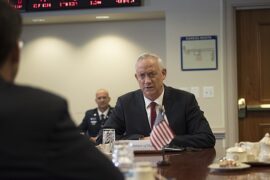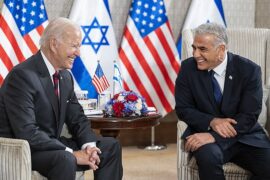Channel 12 News reported on Tuesday that Washington is demanding that Prime Minister Binyamin Netanyahu (Likud) drop judicial reform from his coalition’s agenda in exchange for the Biden administration’s help in mediating a normalization agreement between Israel and Saudi Arabia.
Netanyahu has repeatedly stated that he hopes to achieve an agreement with Saudi Arabia in the near future that would “effectively end the Arab-Israeli conflict.”
Netanyahu reached normalization agreements with the United Arab Emirates, Bahrain, Morocco, and Sudan in 2020.
In an interview with Channel 12 News last Saturday night, Foreign Minister Eli Cohen (Likud) expressed optimism that as a result of the current talks, an agreement could be signed within the next six months to a year.
Despite Jerusalem’s optimism, however, Washington appears to be holding the prospect of Israeli-Saudi peace hostage in exchange for giving in to American demands on domestic Israeli affairs.
The fact that the Americans might try to undermine Israeli-Saudi negotiations, or that they would at the very least make participating in these negotiations contingent on Netanyahu taking the issue of judicial reform off the table, raises some important questions.
For starters, why does Washington care so much?
For decades, the United States has pushed its regional agenda on Israel in the name of “peace” – an ideal that the Americans have long presented as their highest diplomatic value. But the fact that Washington now conditions its assistance in attaining what would be a significant peace deal on Israel halting efforts to empower its electorate over a seemingly all-powerful pro-West judicial system makes clear that the Americans have interests more important to them than peace.
As Israel’s socio-cultural trajectory reveals the country’s westernized ruling class to be rapidly shrinking in favor of “second Israel” (Mizraḥi, Ḥaredi, and national-religious Jews that have all felt marginalized by the more westernized “first Israel” since the state’s establishment), it’s become clear that Washington can no longer take it’s control over Israeli policies for granted.
This has already been made clear by Jerusalem’s refusal to follow Washington into their proxy war against Russia via Ukraine. Maintaining Israel’s Supreme Court as the Jewish state’s most powerful institution could be Washington’s strategy for attempting to retain its control over Jerusalem into the future.
The second question worth asking is the extent to which the Americans have been involved in orchestrating the anti-government demonstrations that began in January in opposition to judicial reform. While Israeli protestors certainly have legitimate concerns regarding some of the details of the reforms that appear to centralize significant power in the government’s hands, the regular mass protests appear to be straight out of a CIA playbook.
It’s also important to note an important distinction between the positions of many of the Israeli protestors and that of Uncle Sam. While most Israelis overwhelmingly support some form of judicial reform so long as it appears to bring balance between the state’s branches of government, the Americans appear to oppose any weakening of Israel’s Supreme Court.
American fears for Israel’s future were further made public on Twitter by former Israeli Prime Minister Ehud Barak, who has been a regular attendee at anti-government protests and has a long history of trying to position himself as “America’s candidate” in Israeli politics.
In April, Barak tweetet that “In conversations between Israelis and Western diplomatic officials there are deep concerns raised of the possibility that if the coup in Israel succeeds, a messianic dictatorship will be established in the heart of the Middle East, which has nuclear weapons, and fanatically wishes for a confrontation with Islam centered on the Temple Mount.”
By coup, Barak means the democratic empowerment of “second Israel” through their elected representatives – a prospect that causes concern for those who prefer to see Israel as an outpost of American power in the Semitic region (or a “villa in the jungle” as Barak has famously put it in the past).
If it’s true that the Americans are behind the anti-government protests, their efforts have also had unexpected consequences.
Member of Knesset Matan Kahana (National Unity) told US officials last month that the refusal by those opposed to judicial reform to report for military duty in protest of government policy has caused a situation where Israel’s military would likely never be able to forcibly expel Jews from the contested West Bank.
According to Yisrael HaYom, Kahana visited Washington in April and participated in meetings regarding the current state of US-Israel relations.
One of the issues brought up during a conversation between the opposition lawmaker and US officials was the consequences of the judicial reform and the mass protests against it. Kahana reportedly stated that the way that the protest of reserve pilots refusing to show up for duty was perceived by the nation has created a situation in which the destruction of Jewish communities in the West Bank is “no longer relevant” because it has now become more acceptable in Israeli society for soldiers to refuse to carry out orders they disagree with.
Washington has long demanded the expulsion of Jews from the West Bank and other lands won by Israel during the 1967 Six-Day War. In fact, shrinking the State of Israel back to its pre-67 size has been at the top of the US agenda for the Semitic region for over 50 years. When Washington forced Israel to expel Jews from the Sinai peninsula and Gaza regions, these expulsions were carried out by Israeli forces, minimizing the scope of violent resistance due to the refusal of most Israelis to use force against their own soldiers. But if any future expulsion would require foreign troops, West Bank Jews would have far less restraints when fighting for their homes and communities.
If Netanyahu truly wants a peace agreement with Saudi Arabia, he should realize that the Americans might no longer be relevant. China has successfully brokered an historic agreement between the Saudis and Iran that the US empire was never able – or truly willing – to fascilitate. The Saudis rightly concluded Beijing to be more capable of controlling Iran that Washington.
Rather than see China’s increased regional influence as a threat, Israel should see it as an opportunity – both to continue the trend of forging normalization agreements with the other Semitic peoples, and also as a means to distance Jerusalem from an empire in rapid decline.






Any peace agreement must be based on a commun interest to both parties Saudi Arabia and Israel and any precondition could harm a future accord . Israel judicial Reform do not concern US .But an accord between US and the big Israel enemy Iran concern Israel .